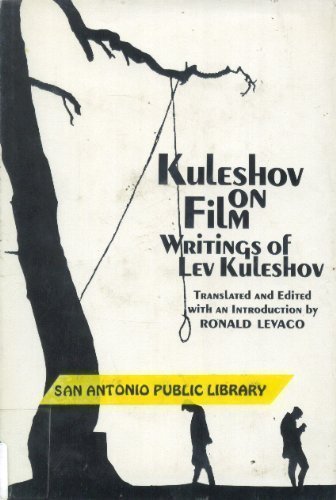Kuleshov on Film: Writings by Lev Kuleshov book download
Par garcia thomas le dimanche, décembre 4 2016, 00:06 - Lien permanent
Kuleshov on Film: Writings by Lev Kuleshov by Lev Vladimirovich Kuleshov, Ronald Levaco


Download eBook
Kuleshov on Film: Writings by Lev Kuleshov Lev Vladimirovich Kuleshov, Ronald Levaco ebook
Page: 121
ISBN: 0520026594, 9780520026599
Format: pdf
Publisher: Univ of California Pr
Most film narratives were analogous to silently filmed plays; each scene took place in front of a stationary camera, which was strategically placed to view the entire set, without any cutting or variation. Russian filmmaker Lev Kuleshov demonstrated this technique in the early 1900s and revolutionized cinema with some very basic editing techniques. The Kuleshov Effect should be covered in your first semester of film study. Film language, as it would later be termed, had very little in the way of grammar, most Eisenstein's contemporary soviet theorist, Lev Kuleshov applied this precept to character development. These three films and four others are showing at Facets Cinematheque this week, along with a film Barnet acted in (Lev Kuleshov's 1924 knockabout farce The Extraordinary Adventures of Mr. This is someone's new rendition of Lev Kuleshov's experiment in editing from the 1910's. The idea is that the actor I also consider myself a cinephile and see movie writing as a gateway to many topics. He conducted a test At the time, the experiment served to show the usefulness and power of film editing, demonstrating how the viewer tends to bring their own emotions to the edited sequence of images and attributing their reactions to the actors. West in the Land of the Bolsheviks (1924) is still dead-on. The Kuleshov Effect is the result of a very famous film experiment done by Lev Kuleshov in the 1910s and 1920s. This technique, described by critic Paul Arthur as “metaphoric The diametrical separation between films critically assembled from newsreels and the formalist “played film” frequently appears in the writings of Soviet editors. In the early 1900′s, a Russian filmmaker by the name of Lev Kuleshov came to the conclusion that two disparate shots edited one after the other are processed “together” in the minds of the audience. Yet the anti-American satire of Lev Kuleshov's The Extraordinary Adventures of Mr. Through-out the films that Kuleshov was creating they contained propaganda a form of information that is biased to support a specific view (in this issue it was a government, political view). Doublier, described as “the spiritual ancestor” of Lev Kuleshov, the Soviet montage theorist, uses the metaphoric properties of film to analogize the event where images do not exist. The viewer was not a passive viewer, who simply marveled at the spectacle, but was an active participant in creating the meaning of the work.